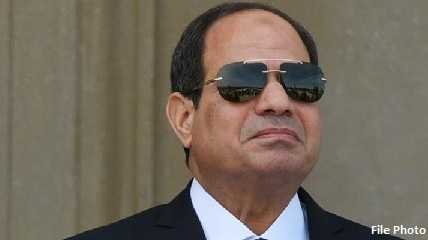
20 Feb 2022; MEMO: During the International Petroleum Technology Conference "Aegis 2022" last Monday, President Abdel Fattah Al-Sisi invited CNN anchor John Defterios to moderate a dialogue session at the conference and witness the developments taking place in the country.
Defterios is a former CNN broadcaster currently working as a consultant for APCO Worldwide, specialising in public relations. Despite Al-Sisi's invitation, the reality of Egyptian and foreign reporters tells another story.
Imprisonment is the fate of field journalists
For years, Egyptian blogger Mohamed Ibrahim, known as "Mohamed Oxygen", roamed the streets of Egypt carrying his camera to convey people's pain and dreams, publishing them on his blog and his YouTube channel, which 386,000 people follow.
However, Al-Sisi's regime considers his videos "a threat to national security".
In April 2018, the National Security Agency (the political security apparatus of the Sisi regime) arrested Mohamed on charges of "joining a group established in violation of the provisions of the law" and spreading false news about the political and economic situation in the country.
Mohamed was imprisoned for one year and three months. He was released in July 2019 with the precautionary measure that he must spend two hours at a police station twice a week answering questions and reporting his activities.
Police re-arrested him in September 2019 while serving the preventive measures in the Basateen Police Department, as part of the ferocious arrest campaign launched against the backdrop of the sudden demonstrations that came out demanding the departure of President Al-Sisi.
The young blogger was charged with the same charges and accused of "participating in a terrorist group to spread false news and statements." He was imprisoned in connection with Case No. 1356 of 2019 Supreme State Security.
Mohamed was imprisoned for a year and two months before the Cairo Criminal Court decided in November 2020 to release him. The security services did not implement the court's decision and included Mohamed in a new case to continue his imprisonment.
The young blogger was charged with the usual set of accusations, again including "joining a terrorist group and spreading false news and statements." In addition, he was imprisoned in connection with Case 855 of 2020 Supreme State Security, a case whose facts – if true – began while Mohamed was already detained.
During his imprisonment, Mohamed was subjected to severe violations. Since February 2020, the high-security Tora 2 prison administration has deprived his family of visiting him – a ban that lasted for more than a year, which led to severe deterioration of his psychological health. As a result, he tried to commit suicide in July 2021 but was saved.
A few days ago, Mohamed's mother passed away. Unfortunately, due to his psychological deterioration, he rejected the prison administration's offer to release him temporarily to receive condolences.
In addition to Mohamed, many field journalists have been subjected to security persecution to prevent them from conveying the truth. Among them is Basma Mustafa, a journalist who was arrested in October 2020 during field coverage of the repercussions of the killing of a citizen at the hands of the police in the village of Al-Awamiya. She was also accused of "joining a terrorist group and spreading false news."
Basma was released a few days later, but the security pursuits continued, which led her to flee the country with her husband and two children. She has not been able to re-enter Egypt since.
Deportation of foreign correspondents
Foreign correspondents who wanted to work in Egypt fared better than their Egyptian counterparts, as the Al-Sisi regime merely deported them or prevented them from entering the country without detaining them in Egypt's notorious prisons.
In February 2019, the Egyptian authorities arrested well-known US journalist David Kirkpatrick upon his arrival in Cairo after spending hours in solitary confinement.
Kirkpatrick worked as bureau chief for The New York Times in Cairo between 2011 and 2015. He was a reporter during former President Mohamed Morsi's era and detailed how the administration of former US President Barack Obama dealt with the situation in Egypt.
In 2018, the Egyptian authorities arrested a British newspaper reporter of The Times after she interviewed a relative of a man who died on a migration boat bound for Europe. The journalist was taken to Cairo airport and forced to fly to London after her arrest.
In 2016, the Egyptian regime deported French newspaper La Croix journalist Remy Bigalio after holding him at Cairo airport for 30 hours, without explanation, despite obtaining permission to work as a reporter in Cairo.
Bigalio explained the decision to deport him as: "Doing my job as a foreign correspondent in Egypt and writing press stories that may not be liked by the Egyptian authorities", which is why they refused his entry and deported him.
In March 2020, Egyptian authorities forced The Guardian journalist Ruth Michaelson to leave the country. They revoked her press accreditation after reporting on a scientific study stating that Egypt was likely to have had many more coronavirus cases than officially confirmed.
The Al-Sisi regime only welcomes journalists who take to the streets to promote its "accomplishments" and prepare reports about its greatness and splendour. On the other hand, those reporting the truth and revealing the human rights violations in Egypt are immediately included in the category of "enemies of the state".




